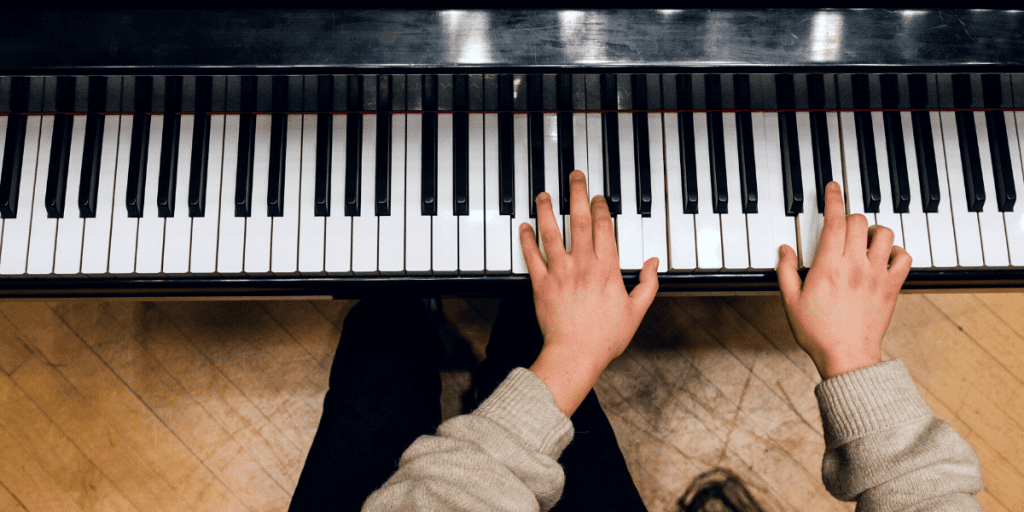We would like to thank Amy Perdew for her contributions to this article on Recreational Music Making. Interested in learning more about RMM? Our latest course, A Pianist’s Guide to Teaching Recreational Music Makers, is available for purchase. Learn more and enroll here. Use code RMMLAUNCH2024 for an exclusive $25 off.

Marketing is the process of promoting and selling products or services. Although our school years were not spent in business or marketing classes, teachers are still salespeople. The image of a hustler or peddler pushing their product on customers can seem off-putting; we are educators and musicians, not hawkers or pitchmen. But if you genuinely love what you do, and truly believe in the benefits it can bring students, then you can embrace marketing and be proud and excited to promote your studio’s offerings.
Even if you don’t yet think of yourself as a salesperson, you are the best advocate for your studio. If you are offering Recreational Music Making (RMM) lessons, it is because you already believe in the benefits they provide your students. Part of your job, then, becomes educating people about those benefits and getting them as excited about learning music in a RMM setting as you are about teaching them.
The Benefits of RMM Lessons
One of the first steps to being ready to promote RMM lessons passionately in your studio is being specific about the benefits. Spend some time listing the advantages of the RMM format, then you can clearly explain the benefits of RMM lessons to your customers.
Some of those benefits might include:
- Playing for fun. There is no pressure in RMM to prepare for performance, recitals, and competitions. RMM is designed for players to enjoy music—just for the sake of music. There is more time to focus on enjoyment and pleasure in a lesson when a lot of time doesn’t have to be devoted to preparing for performances.
- Playing for process. RMM lessons focus on enjoying the process of music making without students worrying about the final product. A student who wants to be challenged, meet high goals, and measure quick progress might not be the right fit for a RMM lesson. A student who wants to actively enjoy the process of learning and creating without the stress of focusing on an end product probably will be a good fit.
- Playing to reduce stress. RMM offers the opportunity to enjoy the benefits of music making, of being creative and expressive, without the stress or pressure of a more disciplined approach. RMM relieves stress!
If you’re offering your RMM classes in a group setting, there are additional benefits inherent to shared lesson time:
- Building skills. Making music in a group inherently improves counting skills, sight-reading skills, ear-training skills, and overall musicianship skills.
- Game play. Any time learning can be turned into a game there is an increase in student engagement and motivation. Group lessons offer the perfect setting to gamify lessons. Anything can be turned into a game and students will simultaneously learn and have fun—how perfect!
- Increased learning. If your group lessons are an hour long (rather than the traditional 30-minute, 1:1 lesson format), you have doubled the lesson, learning, feedback, and practice time for your students.
- Social learning. One of the greatest benefits students recognize (both children and adult students) is the social aspect of making music with friends and learning with others.
A quick note about “shy” students—parents of a shy child may believe their child will do better in a 1:1 lesson since their child is shy. Be sure to point out that a 1:1 lesson puts more of the spotlight and pressure on the individual student. A group format can make a shy student feel more comfortable since all the attention is not directed at them.
Be very clear about these benefits (and any others you personally feel are important) and be ready to share them passionately whenever the topic arises. Be ready to deliver an elevator pitch (the brief summary you would give someone in an elevator about your studio and why they should take lessons with you) on the spot. Be so comfortable with your version of the benefits of RMM lessons that it becomes part of your studio pitch.
Want to learn more about Recreational Music Making? Our new course A Pianist’s Guide to Teaching Recreational Music Makers is now available for purchase. Register to learn more about choosing repertoire, marketing your classes, and inspiring recreational music-makers. Use code RMMLAUNCH2024 for an exclusive $25 off.
MORE ON RECREATIONAL MUSIC MAKING
- COURSE: A Pianist’s Guide to Teaching Recreational Music Makers
- MAGAZINE ARTICLE: Teaching Adults in Group-Piano Settings: Facilitating the Musical Process by Pamela Pike
- MAGAZINE ARTICLE: Take two music lessons and call me in the morning by Rebecca Grooms Johnson
- MAGAZINE ARTICLE: Where can you find training in adult teaching? by Michelle Conda, Debra Perez, Susan Ogilvy, and Jill Hannagan
- WEBINAR: Teaching the RMM Way: A Philosophy to Help Our Music Community Grow with Emily Book McGree and Rebecca Bellelo
- MAGAZINE ARTICLE: The Power of Piano Ensembles: Building Collaboration, Musicianship, and Community by Laura Silva